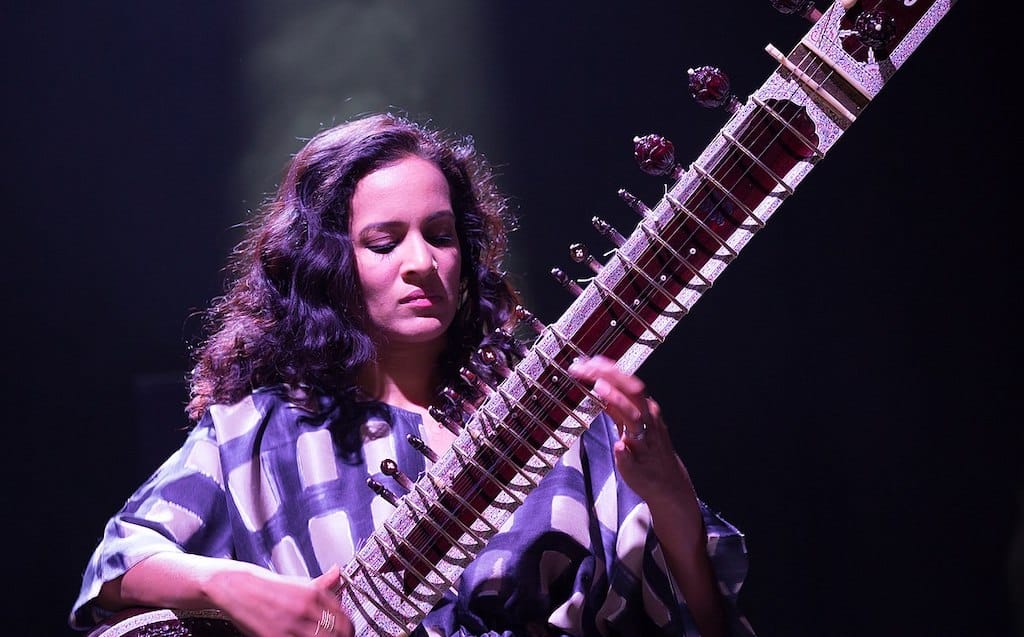Women in Indian Music: Celebrating Iconic Female Musicians

Indian music, with its vast and rich heritage, has always been a realm where cultural expressions and traditions intertwine beautifully. Within this vibrant tapestry, female musicians have carved out significant roles, leaving indelible marks on both classical and contemporary landscapes. Their contributions and achievements not only highlight their immense talent but also reflect their enduring influence in shaping the trajectory of Indian music. This article celebrates some of the most iconic female musicians in India, from classical virtuosos to contemporary pop stars, whose work continues to inspire and elevate the art form.
Classical Virtuosos: Guardians of Tradition
M.S. Subbulakshmi
M.S. Subbulakshmi, often hailed as the ‘Queen of Carnatic Music’, is a towering figure in Indian classical music. Born in 1916 in Madurai, Tamil Nadu, she began her musical journey at an early age, receiving rigorous training in Carnatic music. Her voice, characterized by its purity and emotive power, captivated audiences worldwide.
Subbulakshmi’s contributions extend beyond her musical performances. She played a pivotal role in popularizing Carnatic music outside South India and internationally. Her concert at the United Nations General Assembly in 1966 remains a landmark event, bringing global recognition to Indian classical music. She was also the first musician to be awarded the Bharat Ratna, India’s highest civilian honor, in 1998. Her renditions of devotional songs, such as the “Venkatesa Suprabhatam” and “Bhaja Govindam,” continue to resonate with listeners, cementing her legacy as a true icon of Indian music.
Gangubai Hangal
A doyenne of Hindustani classical music, Gangubai Hangal’s life and career are a testament to her dedication and resilience. Born in 1913 in Karnataka, she faced numerous challenges, including societal prejudices against female performers. Undeterred, she pursued her passion under the guidance of prominent maestros.
Hangal’s deep, powerful voice became her signature, and she excelled in the Khayal genre, delivering performances that were both technically profound and emotionally stirring. Her music was characterized by its rich, intricate phrasing and a deep sense of devotion. Her long and illustrious career earned her several accolades, including the Padma Bhushan and the Padma Vibhushan. Gangubai Hangal’s story is not just one of musical achievement but also of breaking barriers and inspiring future generations of female musicians.
Annapurna Devi
Annapurna Devi, a name synonymous with the surbahar (bass sitar), was an unparalleled maestro in the realm of Indian classical music. Born in 1927, she was the daughter of the legendary Ustad Allauddin Khan, one of the greatest figures in Indian classical music. Despite the gender biases of her time, she emerged as a formidable musician in her own right.
Annapurna Devi’s contribution lies not only in her performances but also in her role as a teacher. She trained numerous students who went on to become prominent musicians, including Nikhil Banerjee and Hariprasad Chaurasia. Her music, though seldom performed in public, was revered for its depth and spiritual intensity. Her life, shrouded in mystique, remains an inspiring testament to dedication and mastery in Indian classical music.
The Golden Era of Playback Singing: Voices that Defined Generations
Lata Mangeshkar
Lata Mangeshkar, known as the “Nightingale of India,” is arguably the most celebrated female playback singer in Indian cinema. Born in 1929, her career spanned over seven decades, during which she lent her voice to thousands of songs across various languages. Her versatility and ability to convey deep emotions through her singing made her the voice of countless heroines on screen.
Mangeshkar’s contributions go beyond her extensive discography. She played a crucial role in setting professional standards for playback singers, advocating for better working conditions and recognition. Her numerous accolades, including the Bharat Ratna, Padma Vibhushan, and Dadasaheb Phalke Award, reflect her unparalleled influence in the Indian music industry. Songs like “Aayega Aanewala,” “Pyar Kiya To Darna Kya,” and “Lag Jaa Gale” continue to be timeless classics, immortalizing her voice in the annals of Indian music history.
Asha Bhosle
Asha Bhosle, Lata Mangeshkar’s younger sister, is another luminary in the world of playback singing. Known for her versatility, Bhosle has sung in various genres, from classical to pop, ghazals to bhajans, and has recorded songs in over 20 languages. Her ability to adapt to different styles and her energetic performances have made her a beloved figure in Indian music.
Bhosle’s collaborations with music directors like R.D. Burman resulted in some of the most memorable songs in Indian cinema. Tracks like “Piya Tu Ab To Aaja,” “Dum Maro Dum,” and “Chura Liya Hai Tumne” showcase her dynamic range and her ability to bring songs to life. Her contribution to Indian music has been recognized with numerous awards, including the Padma Vibhushan and the Dadasaheb Phalke Award. Asha Bhosle’s career is a testament to her enduring talent and her ability to reinvent herself across different musical eras.
Contemporary Icons: Shaping Modern Indian Music
Shreya Ghoshal
Shreya Ghoshal, one of the most prominent playback singers in contemporary Indian music, has captured the hearts of millions with her melodious voice and versatility. Born in 1984, she began her career after winning a popular singing reality show, which catapulted her into the limelight. Since then, she has become a household name, known for her emotive renditions and impeccable control over her voice.
Ghoshal’s ability to sing in multiple languages and genres has made her a favorite among music directors and audiences alike. Her songs, such as “Dola Re Dola,” “Teri Ore,” and “Sun Raha Hai Na Tu,” have garnered critical acclaim and numerous awards, including several Filmfare Awards. Shreya Ghoshal’s contribution to Indian music is significant, as she continues to inspire young singers and maintain a prominent presence in the industry.
Sunidhi Chauhan
Sunidhi Chauhan, known for her powerful and dynamic voice, is another leading figure in contemporary Indian music. Born in 1983, she began her career at a young age and quickly rose to fame with her energetic and versatile singing style. Chauhan’s ability to deliver high-energy tracks as well as soulful ballads has made her one of the most sought-after playback singers in the industry.
Her chart-topping hits, including “Sheila Ki Jawani,” “Kamli,” and “Desi Girl,” showcase her range and ability to adapt to different musical styles. Chauhan’s influence extends beyond playback singing, as she has also been a judge on various singing reality shows, mentoring the next generation of singers. Her contributions to Indian music reflect her dynamic talent and her role in shaping the sound of modern Bollywood music.
Trailblazers in the Independent Music Scene
Anoushka Shankar
Anoushka Shankar, daughter of the legendary sitar maestro Ravi Shankar, has carved out her own niche in the world of music. A virtuoso sitar player, she has been instrumental in popularizing Indian classical music globally and has also ventured into the realm of contemporary and fusion music. Born in 1981, Anoushka began her training under her father’s tutelage and has since developed a distinctive style that blends tradition with innovation.
Her albums, such as “Rise,” “Traces of You,” and “Land of Gold,” have received critical acclaim for their creativity and emotional depth. Anoushka Shankar’s collaborations with international artists and her ability to transcend genres have made her a prominent figure in the global music scene. Her work not only honors her father’s legacy but also pushes the boundaries of Indian classical music, making it accessible to a wider audience.
Bombay Jayashri
Bombay Jayashri, a celebrated Carnatic vocalist, is known for her soulful and evocative singing. Born in 1964, she has received extensive training in classical music and has performed at prestigious venues worldwide. Her voice, characterized by its clarity and emotive power, has earned her a dedicated following among classical music enthusiasts.
In addition to her contributions to classical music, Jayashri has also ventured into film music, with her song “Pi’s Lullaby” from the movie “Life of Pi” receiving an Academy Award nomination. Her ability to seamlessly blend classical traditions with contemporary expressions highlights her versatility and creativity. Bombay Jayashri’s contributions to Indian music are significant, as she continues to inspire and influence both classical and modern music landscapes.
The Future: Nurturing Talent and Breaking Barriers
The contributions of these iconic female musicians have not only shaped Indian music but have also paved the way for future generations. Their stories of perseverance, innovation, and excellence continue to inspire young musicians across the country. As Indian music evolves, the role of women in this dynamic landscape remains crucial.
Initiatives such as music schools, mentorship programs, and platforms for independent artists are essential in nurturing new talent. The increasing visibility of female musicians in various genres, from classical to contemporary, is a positive sign of progress. By breaking barriers and challenging stereotypes, these musicians are not only enriching Indian music but also promoting gender equality in the arts.
Conclusion
The journey of women in Indian music is one of resilience, creativity, and excellence. From classical virtuosos like M.S. Subbulakshmi and Gangubai Hangal to contemporary icons like Shreya Ghoshal and Sunidhi Chauhan, their contributions have left an indelible mark on the cultural landscape of India. As we celebrate these iconic female musicians, it is important to acknowledge their role in shaping the past, present, and future of Indian music. Their legacy continues to inspire, reminding us of the power of music to transcend boundaries and connect us all.






